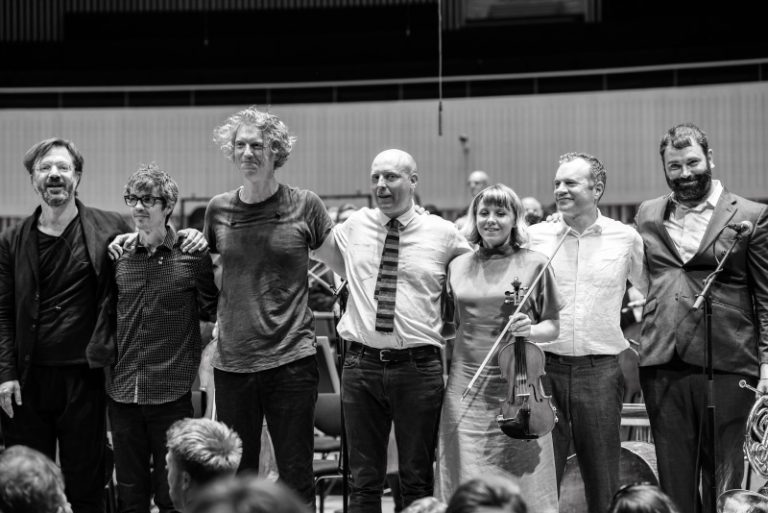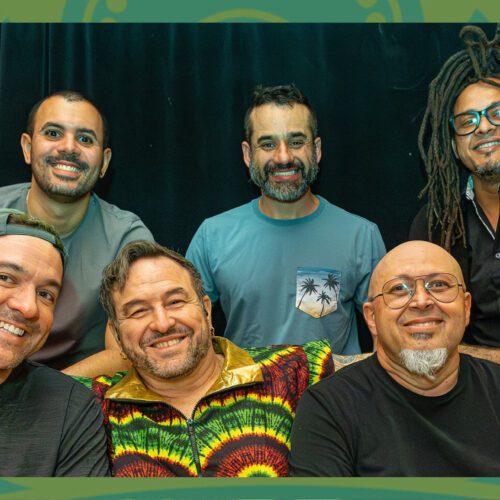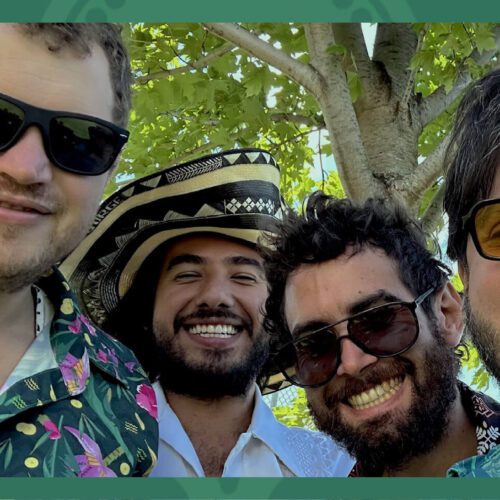Additional Information
Editor’s note: The excellent album House Music was launched at the end of winter 2021 by Bell Orchestre. On March 22, PAN M 360 had posted a large part of this interview with Richard Reed Parry, which we have now enhanced with this symphonic complement! Our spring interview has additional answers provided by the musician in the run-up to the concert by Bell Orchestra with the Montreal Symphony Orchestra, this Thursday at the Maison symphonique.
Richard Reed Parry is one of the main people in charge of Arcade Fire’s “research and development” section. House Music, Bell Orchestre’s new album released after a long recording silence, is another convincing example of this quest, which he generously tells us about here.
Recall that the album House Music was created from motifs around which Bell Orchestre improvised collectively and then improved the first takes by means of electronic treatments, filters, the addition of instruments, and various edits. Based on the piece “V: Movement” from this album, and directed by Kaveh Nabatian, the short film IX: Nature That’s It That’s All superimposes elements of archival films featuring ecstatic crowds at a carnival.
Working with sound engineer Hans Bernhard, Bell Orchestra wired every corner of a country house owned by fiddler and singer Sarah Neufeld in Vermont—hence the pun House Music. For this immersive recording, she welcomed Pietro Amato (horn, keyboards, electronics), Michael Feuerstack (pedal steel guitar, keyboards, vocals), Kaveh Nabatian (trumpet, gongoma, keyboards, vocals), Richard Reed Parry (double bass, vocals) and Stefan Schneider (drums). The ensemble spent two weeks exploring and refining the material: daily improvisations culminating in a conclusive 90-minute session from which the fine marrow was extracted.
The material was then arranged by Owen Pallett for the Aarhus Symfoniorkester, a Danish symphony orchestra under the direction of German maestro André de Ridder. An initial performance took place in Hamburg in August 2019 and… everything stopped, which explains the delay in the release of this superb album conceived some time ago. Montreal music lovers rejoice, Bell Orchestre and the Montreal Symphony Orchestra are reviving this wonderful material!
PAN M 360: After all these years, more precisely since 2009, the year of release of the album As Seen Through Windows, one could think that Bell Orchestre was dead, which is not the case. What’s up?
Richard Reed Parry: We didn’t record for over 10 years, but there was never an official stop. Life has been busy, too many projects, and Bell Orchestra has never been a full-time band. It won’t be but it still has vitality, there is a deep musical connection between us. Honestly, this album is the best we’ve recorded so far. It best realizes what the true essence of the band is. I’m very happy with it, we captured something that is overly conceived. But it’s not raw. The heart of the album is the spontaneous eruption of what the band is and what it is capable of.
PAN M 360: Unlike previous albums from the 2000s, this one is more singular, more mature, far beyond the indie trend of the time that you were part of and witnessed.
Richard Reed Parry: Thank you! And I couldn’t agree more! (laughs).
PAN M 360: What are the differences between the previous staff and this one?
Richard Reed Parry: Mike Feuerstack is now a full member of the band, he was previously a guest. Colin Stetson was also a guest, a wonderful addition at that time. Things have changed since then, he and Sarah got divorced… the only thing you can be sure of is change, right? If you survive the change, change yourself and it works, then… yeah! If not, it’s the same staff as before.
PAN M 360: If we try to pinpoint the changes between this album and the previous ones, what would you say from your side?
Richard Reed Parry: The main difference is that the foundation of this album is improvised, not planned, not premeditated, not discussed. This 45-minute recording is essentially an hour-and-a-half-long improvisation that we did after several other improvisation sessions. We listened back to everything we recorded during those two weeks of work, we identified several very good compositional ideas, but this 90-minute session was very clear, articulate, even if sometimes abstract. Between 65 and 70 percent of the music for this album was already there.
And then we reworked the material: fill in something here, take out this part, cut this other part in half. Figuratively speaking, it’s like a sculptor looking at a huge piece of granite and in his warehouse, there are other weird shapes carved in the stone. One of them would accidentally fall, resulting in a new shape that the artist would keep for his final sculpture. Literally, some of the accidents allowed us to access new shapes and see this work very clearly as a whole. At least, that’s how I felt.
PAN M 360: More specifically, what happened?
Richard Reed Parry: Some of the movements on the album emerged during the big improvisation, some occurred in the same order as the final recording, some evolved in the treatment of the raw material. Sometimes we agreed that we had to cut five minutes because it became boring and we lost the thread, we had to edit. The raw material was sometimes reworked with new ideas for compositions, arrangements, melodic insertions, instrumental additions, overlays, editing. So you get more shine on the raw material while keeping the original properties, the benefits of the first ideas.
PAN M 360: Were your best decisions unconscious?
Richard Reed Parry: This album would have been very different if we hadn’t had these ideas while we were playing and moving around together. I believe that the unconscious musical mind can be wiser and more connective than the musical mind that comes primarily from the intellect. Of course, some artists can take an intellectual concept to a high level of refinement and break down walls. The best, in fact, is when the “holy spirit” of music emerges from the unconscious and engages the intellect as well.
PAN M 360: Improvising, recording, reshaping, editing, filtering… Isn’t this album a metaphor for creation in the digital age?
Richard Reed Parry: Not quite. One of the big inspirations for the process of this record was Miles Davis’ famous Bitches Brew album. In the way they worked, he and the musicians who participated in those sessions were pretty close to what we did. They had recorded everything they could, for as long as they could, and then made changes afterward—cutting trumpet lines, adding a keyboard, shortening certain sequences, etc. They used the technology of the tape recorder to record the music. They used the technology of the time but with that same idea: capture the original raw energy, then rearrange certain parts and manipulate the recording to achieve an effect that was unattainable in the moment. We wanted to do something like that: improvise, record, fall in love with some of the takes after listening to them and then recreate with the freshness of the ideas we got from the improvisation. I’m very happy that it worked out so well.
PAN M 360: The Orb and Talk Talk, which have little to do with Miles Davis, would also have been major influences. Explanation?
Richard Reed Parry: The Orb Live ’93 is one of my top ten albums, all styles, and eras combined. The idea was to create in real-time, to use very simple but elegantly crafted musical ideas and let in fragments of recordings, sounds of nature, sounds of the city, chaotic energies, interesting in every way. Thus deforming, distorting, extending, adding, expanding. You float in this music, very strong ideas come out. That chaos was so alive! I was in high school, I wondered how they could have made such an album. I still listen to it today with the same pleasure.
As for Talk Talk, the last two recordings [Spirit of Eden and Laughing Stock] are in a similar vein: beyond the structure of the songs, it was a matter of Mark Hollis trying to capture the energy flowing at a given moment, doing things unconsciously, inviting musicians to improvise in the dark around a single element of a song. In a way, to float and remain detached from any conscious decision making, and to welcome the sacred ghost that is impossible to find normally. You can’t demand that this ephemeral quality appear, you can only wish for it.
PAN M 360: As a composer and certainly the closest to contemporary music in Arcade Fire, what is your contribution to this new Bell Orchestre album?
Richard Reed Parry: What I brought to the table was mostly harmonic loops played on my double bass, with a visceral sense of movement. Really simple things that you could sing melodies over, play different chords… We needed that kind of gravitational pull at the center of the album without it being the centerpiece. So it was kind of a sketch, otherwise, it was a very open palette from this seemingly simple idea and it opened the door to other even more interesting ideas.
THE BELL SYMPHONY ORCHESTRA: INTERVIEW SUPPLEMENT
PAN M 360: Can you explain how the symphonic arrangements have been designed with the band’s music?
Richard Reed Parry: We tried to intertwine the band and orchestra in many ways —sometimes we are playing in unison, blending the parts that we ourselves are playing into what the orchestra play, sometimes the orchestra takes a single small element of what a band member is doing and magnifies it in this massive acoustic way. Often the orchestra also extends our own gestures far beyond what we ourselves are doing: enhanced and extended chords, sonic gestures that intermingle with our own, and occasionally adding new chords and textures that simply weren’t there in our album.
PAN M 360: So André de Ridder had to work with Owen Pallett, who wrote the arrangements.
Richard Reed Parry: Our dear friend and a longtime collaborator for many of us. He’s so gifted at orchestration and has supported us a lot over the years. In fact, the first time Bell Orchestre played in Toronto, it was opening for Owen‘s old band Les Mouches. Andre is also a dear friend and wonderful conductor and collaborator, and was the one who proposed we do this with the MSO! He’s wonderful at making crossover collaborations happen with orchestras and other artists.
PAN M 360: What is the nature of the dialogue between the band and the big orchestra?
Richard Reed Parry: Music, though it’s obviously a common shared language, has spent so much time divided into “separate” genres by varying combinations of education, semantics, class, and creative process. I am so happy to live in an era where the borders have broken down quite a lot and we can even consider doing such collaborations, and thrilled that an orchestra as great as the OSM is open to doing such a concert. Once we are all on a stage together, we are obviously united in purpose and it’s really just about finding the quickest way to best realize this large, slightly unusual musical beast/piece and bring it to life! I have a handful of friends who play in the MSO who come see various other performances I do, so there’s a nice feeling of interchange there.
PAN M 360: What about the relationship between Bell Orchestre and OSM and its conductor for the event?
Richard Reed Parry: Hopefully we will all be functioning as one giant synergistic organism. House Music wants to feel like a combination of spur-of-the-moment decisions and interweaving spontaneous ideas that emerge and vanish, along with well-organized, well-defined compositional threads, chaotic moments, groovy sections, and sonic interplay reflecting many different musical angles simultaneously. At a certain point, the whole orchestra and band will all be singing together, which is one of my favorite parts of the whole piece…
PAN M 360: Do you see some important differences between the way it was played in Hamburg and the way it will be in Montréal?
Richard Reed Parry: Mostly that we know the whole thing by heart now! Some of us were still using scores when we performed at the Elbphilharmonie and thankfully we have totally internalized the music now, which was quite a challenge for 45 minutes of music, much of which is quite asymmetrical, to put it mildly. So it will be exciting to just be playing music, without having to read scores. The orchestra isn’t quiiiiite as familiar with the music as we are, so obviously, they will still be using scores (laughs).
Photo: Hreinn Gudlaugsson
Bell Orchestre and MSO are performing at the Maison symphonique, Thursday, November 25, 7:30 PM
























